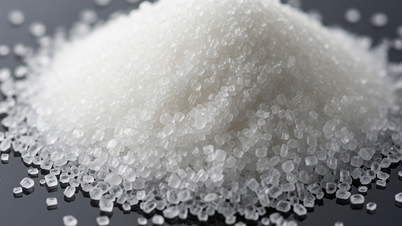In the summer, many Vietnamese families cannot do without a bowl of refreshing Malabar spinach soup. This easy-to-grow, easy-to-eat vegetable is not only a familiar dish but also considered a "benign medicine" that helps cool the body and relieve constipation.
Malabar spinach - a popular vegetable rich in nutrients
Malabar spinach is a succulent green leafy vegetable, popular in tropical Asian countries. According to the US Department of Agriculture (USDA), 100g of Malabar spinach contains about 19kcal, 8000IU of vitamin A, 102mg of vitamin C, and many minerals such as: iron, calcium, potassium, magnesium and soluble fiber.
Malabar spinach is special because of its high content of mucilage – a natural polysaccharide – which helps soothe the lining of the stomach and intestines. This is the reason why Malabar spinach is often recommended in cases of internal heat, constipation or mild digestive disorders.
Outstanding benefits of using Malabar spinach regularly
According to PubMed, Malabar spinach has many health benefits if used properly. The fiber and mucus in the vegetable help promote bowel movements, prevent constipation and reduce the risk of hemorrhoids. For the elderly and children, Malabar spinach soup is a good choice to keep the digestive system healthy.

Malabar spinach has many health benefits (Photo: Getty).
In addition, the high amount of vitamin A in Malabar spinach plays an important role in protecting mucous membranes, vision and skin. Antioxidant compounds such as lutein and zeaxanthin help slow down the process of macular degeneration - a common cause of blindness in the elderly.
Vitamin C in Malabar spinach also helps improve immunity, helps the body produce white blood cells, and supports collagen synthesis - an essential factor to heal damaged tissue and maintain skin firmness.
Some studies at Mahidol University (Thailand) also show that Malabar spinach extract has the ability to reduce "bad" cholesterol levels in the blood and improve vascular elasticity, contributing to the prevention of cardiovascular disease.
Side effects of eating too much Malabar spinach
Despite its many benefits, according to the World Health Organization (WHO), long-term consumption of green vegetables with high oxalate content can affect kidney function. Malabar spinach is among the vegetables with significant oxalate content - a substance that when combined with calcium will form crystals, accumulating in the kidneys.
People with a history of kidney stones, especially calcium oxalate stones, should be careful when eating Malabar spinach too often or combining it with calcium-rich foods such as milk. In addition, people with bloating and diarrhea should not eat too much raw Malabar spinach because it can cause digestive disorders.
A study by the National University of Singapore also warned that eating too much Malabar spinach over a long period of time can reduce iron and calcium absorption due to the presence of phytate - a compound that prevents minerals from binding to the body.
Malabar spinach is a good food but should not be eaten more than 3-4 times per week, and should be alternated with other vegetables such as spinach, amaranth, squash. When preparing, it should be boiled, cooked in soup or stir-fried to reduce the amount of oxalate and phytate, and should be combined with foods rich in vitamin C such as tomatoes, oranges, lemons to increase iron absorption.
For young children, the elderly or people recovering from illness, priority should be given to eating well-cooked Malabar spinach. People with gout should also limit their intake because Malabar spinach can stimulate the production of purines - a substance that increases uric acid in the blood.
Source: https://dantri.com.vn/suc-khoe/dieu-gi-xay-ra-khi-an-rau-mong-toi-hang-ngay-20250613085212204.htm








![[Photo] President Luong Cuong receives Speaker of the New Zealand Parliament Gerry Brownlee](https://vphoto.vietnam.vn/thumb/1200x675/vietnam/resource/IMAGE/2025/8/29/7accfe1f5d85485da58b0a61d35dc10f)





















![[Photo] Hanoi is ready to serve the occasion of the 80th National Day Celebration on September 2nd](https://vphoto.vietnam.vn/thumb/1200x675/vietnam/resource/IMAGE/2025/8/29/c838ac82931a4ab9ba58119b5e2c5ffe)




























































Comment (0)